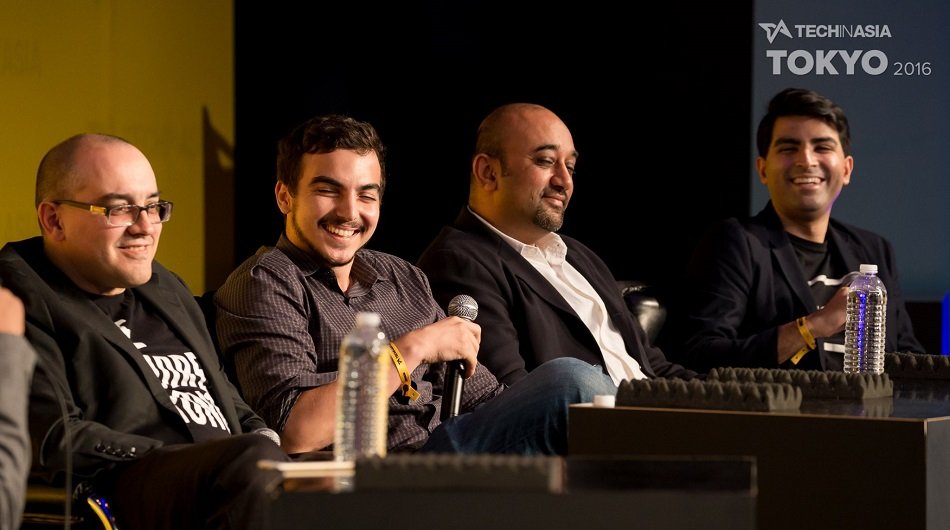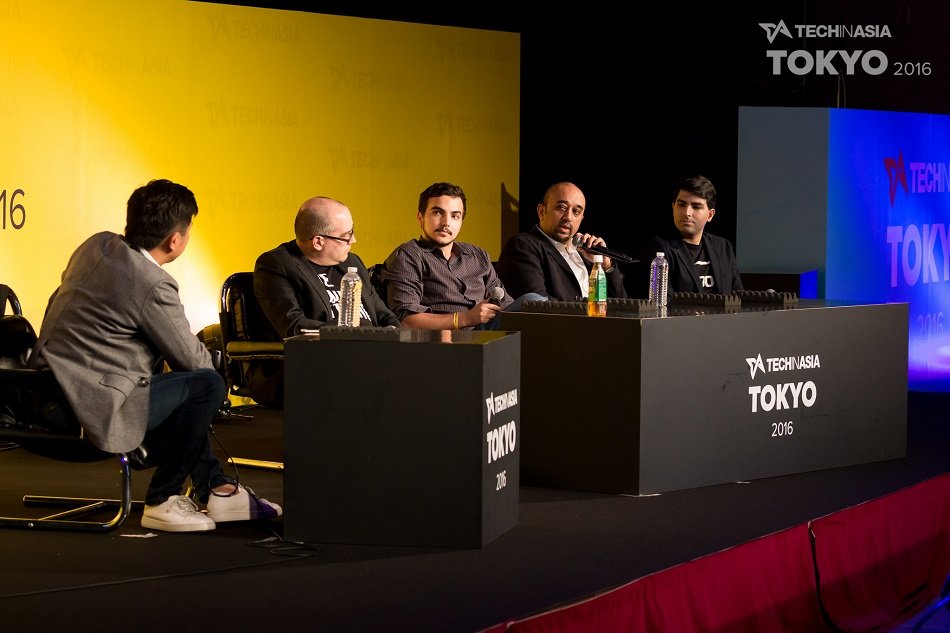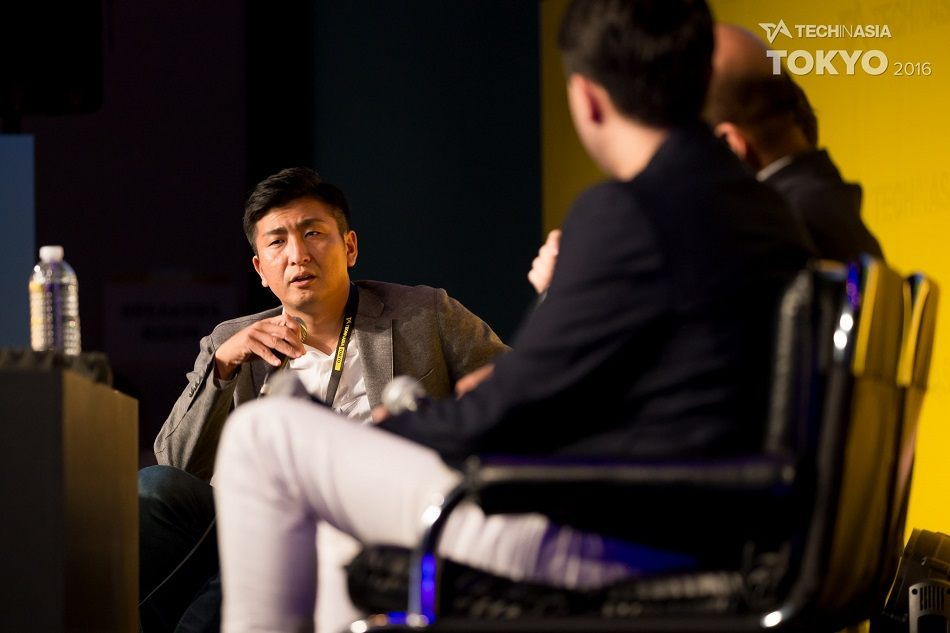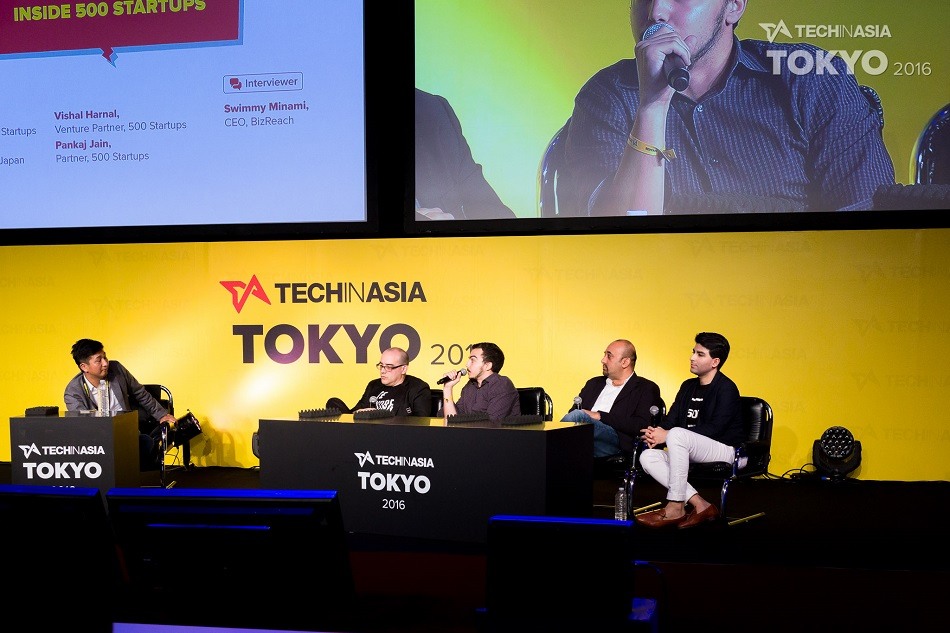
(From l to r:) 500 Startups’ Dave McClure, James Riney, Pankaj Jain, and Vishal Harnal. Photo credit: Tech in Asia / Michael Holmes.
It was a 500 Startups extravaganza as no fewer than four people from the international venture capital firm took the stage at Tech in Asia Tokyo 2016.
The VC that started out in 2010 by Dave McClure and Christine Tsai with the ambition of helping build 500 businesses now has a global portfolio of 1,600 companies. “Maybe 500 VCs is a better name,” Dave joked.
When asked what makes the VC special, Dave pointed to 500’s near-global presence – of the 1,600 businesses it has invested in, about 500 are outside the US.
Another distinguishing element is the attention the VC pays to its portfolio companies’ growth by providing support in marketing, sales, customer acquisition, and more. The approach seems to be paying off – 500 Startups recently saw its first IPO with cloud communication software company Twilio going public in June.

Photo credit: Tech in Asia / Michael Holmes.
Growing in Southeast Asia and India
Besides Dave, the panel featured James Riney, head of Japan for 500 Startups, and partners Pankaj Jain and Vishal Harnal, responsible for India and Southeast Asia, respectively.
Pankaj mentioned that 500 Startups has made about 50 to 60 investments in India in the last couple of years, targeting both business-to-business and business-to-consumer companies. The VC will look toward video-related companies in the next 18 months as data prices drop in the country, which will result in a streaming boom.
It looks like it’s a good time to invest in India right now, according to Pankaj. Last year’s inflated valuations and abundance of cash resulted in some rude awakenings for founders and investors, but this has cleared the way for smarter investments.
It was quite a harrowing process.
“At the seed stage I think there was a huge frenzy last year, and some sanity has kind of returned to the market, which is good,” he said. “I still think that the opportunities at the seed stage are pretty significant over the next couple of years.”
In Southeast Asia, 500 has completed about 120 deals, including high-profile companies like Uber arch-rival Grab and mobile marketplaces Carousell and Bukalapak. “Most of those deals were done on a team of two people,” Vishal said. “It was quite a harrowing process, but we were fortunate to have people a lot better than ourselves to support us in getting deals done and scaling and growing across the region.”
Vishal’s impression of Southeast Asia was as optimistic as that of Pankaj’s for India. “There’s a lot of capital that’s filling up gaps that used to exist in the market in Southeast Asia, so venture capital funds that started at the seed stage, the series A stage, are now moving to the series A and series B respectively,” he said.
The market is seeing new players come in, especially from the corporate side, investing both in companies and in new funds. Southeast Asia also has the added bonus of multiple market opportunities in close proximity, so companies from one country often scale across the region.

BizReach CEO Swimmy Minami interviewing the 500 Startups panel members at Tech in Asia Tokyo 2016. Photo credit: Tech in Asia / Michael Holmes.
“Companies in Singapore that we’ve invested in aren’t just Singapore companies, they’re global companies. They provide services and have a customer base that’s truly global in nature,” he said. “Companies in Indonesia are tackling a market size that’s 240 million people, they don’t even need to move out of their back yard. There’s just so much opportunity in that country. And for Malaysia, Singapore, Vietnam, Thailand, moving into markets that are close by is not that difficult anymore. Cities aren’t very different at the end of the day across this market.”
Indonesia is, in fact, the “hot” country for investors right now, Vishal said, attracting a lot of attention from Chinese funds and companies. “Everyone hears about Alibaba’s billion-dollar acquisition of Lazada, but what many people don’t know is that there are 40 or 50 other companies in China valued over US$1 billion that have peaked in that country – and they’re looking to expand in Southeast Asia.”
Turning Japanese
In Japan, 500 Startups launched a US$30 million fund last September, announced on stage at Tech in Asia Tokyo 2015. Since then, the VC has invested in seven companies there and is optimistic for the future, as James also mentioned in his keynote the previous day. Additionally, 500 has tied up with the Japanese government, which will allow it to place some more ambitious bets on areas like robotics and biotech.
Even though valuations got a little crazy, there are still amazing companies being founded.
James noted that 500’s edge lies in the VC making a lot of small investments in the beginning and then following up with larger bets on the more promising performers.
The company has also built a strong network in most of the markets it’s active in, which is readily available to its portfolio companies and to players interested in those countries. “Basically any country you want to expand into, we probably have some key person in that country within two degrees of separation,” James said.
This kind of personal touch means that 500 can deliver value that investors with deeper pockets perhaps can’t. While Japan has plenty of corporate venture capital firms, those companies tend to be faceless – a portfolio company will be connected with one person in that organization and then, a few years later, that person will have been moved to another department. That prevents the building of long-term relationships between company and investor.
Plus, 500 Startups is literally invested in the companies it backs. “We only get rich if the companies we invest in do well,” James said.
Slowdown
Dave talked about the market slowdown that many have feared this year.
“I think starting in Q4 last year and in Q1 this year there’s a lot more fear than there was over the last two years,” he said. However, seed-stage and series A investments weren’t hit as hard by this downturn.
“The press [always thinks] the world is going to fall tomorrow and tries to say that startups have been overvalued for the last five years. Eventually they’re going to be correct,” he said. “But I really feel like even though valuations got a little crazy, there are still amazing companies being founded, generating lots of revenue. Obviously we’re biased, but we feel like there’s a ton of innovation happening and, relative to corporate valuations, I actually don’t think the market is that overvalued.”

Photo credit: Tech in Asia / Michael Holmes.
Shining a light into Japan’s black box
One of 500 Startups’ goal for the Japanese market is to encourage more interest in the country from investors and companies looking to acquire, James said.
“There are cases where Sequoia will invest in a company in Silicon Valley and, generally speaking, there’s a six- to seven-month lag where a similar company pops up in Japan,” he explained. “And so you’d think that when the timing is right and that Sequoia company raises a series D or later stage and has the capital to expand into the Japanese market, it’s going to consider it as a market. And it’s going to make a calculation – should it compete or should it buy?”
[I wish] for Japan to have more open doors and opportunities for immigrants to come here as well.
500 Startups wants to be the player that helps with that decision, James said, seeing as a lot of companies looking to enter Japan don’t really know much about the market. “I think a lot of times, when foreign companies expand to Japan, they assume they can do it themselves. So they end up hiring some bilingual country manager that’s not necessarily the right person for the job.”
Dave agreed that there is a lot of opportunity, both for US companies to expand to Japan and for Japanese companies to grow outside of the country’s borders. “I don’t think there’s always been an easy path for that to happen, but there have definitely been some successes in the past,” he said. He added that more than half of the revenue generated from its portfolio companies in Japan comes from foreign customers.
“We think there’s opportunity to bring foreign capital into the growth stage,” James said. “So we can invest in those companies early on and use our network to build relationships so they can raise money from abroad as well. Right now Japan is a completely black box and [foreign investors] don’t know any of these companies. When I saw that Mercari hadn’t raised from anybody in the Valley I was actually really disappointed.”
Escaping the comfort zone
The panel touched on the issue of how Japan can boost entrepreneurship. One way the government can help, James pondered, is to require all students to spend some time studying abroad. “It doesn’t mean you have to come back and start a company. I think that experience in itself is going to open your mind – you’re going to experience a completely foreign environment.”
Dave insisted there has to be fundamental change to Japan’s mindset to unleash the country’s potential.
“I think there are some amazing, inspirational entrepreneurs in Japan,” he said. But for that to happen, a lot of them have had some kind of experience outside the country. Similarly, Japan should start encouraging more people to come, bringing their expertise with them.

The packed audience applauded Dave McClure’s distinctive call to action. Photo credit: Tech in Asia / Michael Holmes.
“[I wish] for Japan to have more open doors and opportunities for immigrants to come here as well. And whether they stay here or they leave, I think [the country should] just encourage more of that. I think we’re all aware of some of the demographic issues in Japan and some of the challenges that may be facing the country in a couple of decades and I think there’s a lot to be said for trying to open up Japan more.”
Dave stressed he’s always believed Japan has huge potential, but it seems stifled. “If you go to Silicon Valley or Beijing, those are really competitive, very big markets but have many people competing for them. You come to Japan and first of all, nobody’s in Japan except the Japanese, and even the Japanese aren’t competing very much in Japan. What the fuck is going on?” he asked, to surprised laughter and nervous applause from the packed audience.
“You have one of the largest economies on the planet, one of the highest spending economies, one of the most technically educated populations on the planet, what the fuck is the problem? Come on, start companies! We’re going to put money into you, plenty of money!” he urged.
“The history of Japan has always been about overcoming odds and innovation,” he concluded.
This is part of the coverage of Tech in Asia Tokyo 2016, our conference taking place on September 6 and 7.
This post Dave McClure on Japan’s slow startup dawn: ‘What the fuck is the problem?’ appeared first on Tech in Asia.
from Tech in Asia https://www.techinasia.com/500-startups-panel-tia-tokyo-2016
via IFTTT
No comments:
Post a Comment